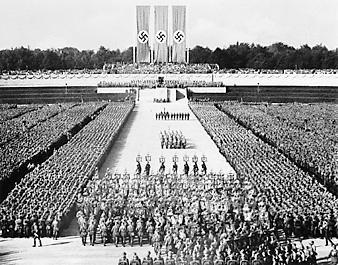Riefenstahl, Leni, << REE fehn shtahl, LEHN ee >> (1902-2003), was a German filmmaker known for two brilliant and controversial documentary motion pictures—Triumph of the Will (1935) and Olympia (1938). The films were made with the support of Nazi ruler Adolf Hitler. Her film activities led to charges that she played an important part in the Nazi propaganda effort, but Riefenstahl denied that she was an admirer of Hitler.

Helene Berthe Amalie Riefenstahl was born on Aug. 22, 1902, in Berlin. She was a dancer and painter before entering the motion-picture industry in the mid-1920’s as an actress. She directed her first film, The Blue Light, in 1931. Riefenstahl filmed a Nazi Party convention in Nuremberg in 1934. The result was Triumph of the Will, often called one of the most powerful propaganda films ever made. Riefenstahl used 30 cameras and 120 assistants to record the convention, which glorified Hitler and the Nazi Party. The two-part Olympia was a record of the Olympic Games held in Berlin in 1936. The film is less political than Triumph of the Will and has been praised for its brilliant visual portrayals of athletic grace and strength.
After the German defeat in World War II (1939-1945), Riefenstahl was imprisoned as a Nazi propagandist for almost four years. In 1952, a German court cleared her of charges that she collaborated with the Nazis, but she remained the subject of much criticism. Riefenstahl’s association with the Nazis ended her film career for many years after the war, and she turned to still photography, working for magazines and newspapers. She won acclaim for her photos of the Nuba people in Sudan. Riefenstahl took up underwater diving in the mid-1970’s. She made a final motion picture, Underwater Impressions (2001), a survey of sea life, mainly in the Indian Ocean. She wrote an autobiography, Leni Riefenstahl: A Memoir (1993). Riefenstahl died on Sept. 8, 2003, at the age of 101.
